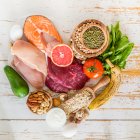Related articles
-
 Ever Wondered How to Make Paneer at Home? Here is the Complete Guide to Take Out Soft and Creamy Paneer from Milk at Home (2021)
Ever Wondered How to Make Paneer at Home? Here is the Complete Guide to Take Out Soft and Creamy Paneer from Milk at Home (2021)
-
 Want More Tantalizing Breakfast Ideas? Here are 6 Scrumptious Egg Recipes for Breakfast That Will Make You Want to Eat Eggs All Day (2020)
Want More Tantalizing Breakfast Ideas? Here are 6 Scrumptious Egg Recipes for Breakfast That Will Make You Want to Eat Eggs All Day (2020)
-
 How to Increase Weight: Foods to Include in Your Diet for Your Weight Gain Journey + Tips for Gaining Weight (2020)
How to Increase Weight: Foods to Include in Your Diet for Your Weight Gain Journey + Tips for Gaining Weight (2020)
Why You Need to Have Healthy Food
To stay healthy, we must have a healthy diet. You must take note that unhealthy eating can lead to obesity which can, in turn, lead to various chronic diseases. Moreover, if you have junk food, you may be taking lots of added sugar while being deprived of the essential nutrients to stay healthy.
A healthy diet can prevent disease and affect your mental health. If you want to lose weight, you need not starve but have nutritious food. Healthy eating is not about reducing your daily intake, but you must have wholesome food covering a balance of the necessary nutrients. In this article, we will learn some of the benefits of healthy eating in detail and then go in further detail about some of the healthy food.
Benefits of Healthy Eating
Helps in Weight Loss
A well-balanced diet can help you in many ways. And it includes losing the excess weight. Whenever your diet has more of processed foods, you tend to gain weight because of the more calories it has. Studies have also found that food that is rich in fibre and lean proteins helped people to lose weight scientifically.
If you are looking to reduce your weight, you must have a lower amount of calories every day. It includes getting rid of junk food like pizzas, burgers and carbonated beverages. Having a healthy diet in the correct proportion helps to lose weight and keep yourself fit.
Keeps Your Body Fit and Fine
A healthy body prevents chronic diseases and obesity that helps to keep you fit and fine. Those who are obese run the risk of having cancer. If your diet contains an adequate amount of fruits and vegetables, you can be free from chronic diseases. Studies have also proved that a healthy diet reduces the risk of gastrointestinal cancers. The phytochemicals act as antioxidants and also include other nutrients like vitamins, carotene and lycopene.
Healthy food also prevents cardiovascular disease and diabetes. It is more critical for those with diabetes to have healthy food without any added sugar, lose weight and keep heir cholesterol levels within the normal range.
Boosts Immunity
A healthy diet boosts your immunity that depends on the white blood cells to produce antibodies to fight any pathogen. You must also have a low-fat diet to boost your immunity. A plant-based diet is ideal for a lower BMI, which will improve your immunity too.
Research shows that fruits and vegetables contain large amounts of vitamins and beta-carotene, which improves your immune system. Apart from having a healthy diet, you must also improve your living standards, it includes giving up on bad habits like smoking and drinking alcohol. You must even sleep well to enhance your immunity. Other food like oily fish contain large amounts of omega-3 fatty acids and prevents autoimmune diseases like rheumatoid arthritis.
Stronger Bones
Having healthy food also improves the health of your children. You must have food rich in calcium and magnesium for strong teeth and bones. Healthier bones are necessary to prevent osteoarthritis and osteoporosis when you grow older. Foods that are rich in calcium are cabbage, legumes, broccoli, low-fat dairy products, fish, etc. On the other hand, magnesium is rich in whole grains, green vegetables and nuts.
Your children need to look up to you to know about a healthy diet. It has shown that children who have less sugary food are known to be healthier. They may be involved in cooking to allow them to garner more knowledge about a healthy and balanced diet.
The List of Healthy Foods
Pulses
As they are rich in protein and fibre, pulses can help you to manage your weight. They also have carbohydrates that take longer to break down, and you have loads of energy for a longer time. It also has lots of resistant starch for a healthy gut. Pulses can also help to control blood sugar levels and useful for people with diabetes as they are not starchy food.
Pulses are rich in many vitamins, protein, minerals and fibre. Chickpeas provide lots of fibre, protein, folate along with phosphorus and iron to your body. Lentils are known to be rich in proteins and are also a great source of iron for the body. Apart from proteins, arhar also has amino acids like lysine and methionine. Other pulses like black matpe and moong are abundant sources of protein. Kidney beans help to strengthen the bones and contain iron and folate, apart from proteins.
Citrus Fruits
Citrus fruits are known to have vitamins and minerals in plenty. They also have lots of fibre and are low in calories. They boost resistance against cancer and improves the health of the heart.
Grapefruit has a direct correlation with weight loss and also has reduced insulin resistance which is implicated in numerous chronic diseases. They are rich in Vitamin C, calcium, potassium and magnesium. It also has abundant carbohydrates. The flavonoids help to protect you against several cancers.
Oranges are rich in Vitamin C and antioxidants. Lemons and other citrus fruit to have several health benefits. They have Vitamin C and antioxidants in abundance. They also have other phytochemicals like pectin, folic acid and potassium.
Eggs
Eggs are known to increase the levels of LDL cholesterol in some people, but it is among the healthiest foods that you can have. They have lots of fat and proteins and are satiating. Eggs are also rich in Vitamin B2 and B12, which help in generating the red blood cells and preserving energy. It is also rich in leucine – an amino acid that helps to synthesise proteins and choline that is necessary for the cell membranes.
Studies have shown that people who had eggs for breakfast had their stomach full for a longer time. Respondents also experienced weight loss if they had eggs for breakfast. Eggs can provide with most of the necessary nutrients that allows you to go on a restricted diet. Eggs are known to contain the nutrients lutein and zeaxanthin - the antioxidants that reduce the risk of cataract and macular degeneration.
Green Leafy Vegetables
Having a diet rich in vegetables can lower your overall intake of calories. Green leafy vegetables have high amounts of beta-carotene and lutein that help to reduce cancer. It also has large amounts of vitamins and minerals.
Spinach is known to be among the healthiest and contains antioxidants and vitamins. It also contains lots of fibre and minerals like zinc along with vitamin B1. It reduces oxidative stress and is beneficial for your eyes. It regulates blood pressure and is also suitable for your bones.
Scallions or spring onions contain numerous nutrients, including vitamins A and K and minerals like iron, potassium, magnesium, folate, etc. It strengthens the bones and prevents cancers. Others like cabbage can also help in preventing cancer and can also be fermented to support digestion and improve the immune system.
Fish
Fish and seafood are rich in omega-3 fatty acids along with iodine. Studies show that people who have lots of seafood have a lower risk of dementia and heart disease. They are also helpful for your eyes and the brand. Fish is also widely recommended for expectant mothers. Fish also do not have any saturated fats, which makes it good for your heart. It is rich in Vitamin D also and helps to absorb other nutrients easily.
Fish contains various minerals that are helpful too. Iron helps to improve the haemoglobin levels in the body. Zinc helps to boost the immune system and helps to stimulate vital enzymes to ensure our body functions well. You can have the widely available fish like rohu that is packed with omega-3 fatty acids and vitamins. Katla also has proteins and vitamins in plenty. It has low calories and is a healthy option for those conscious of their weight. Pomfret, hilsa and bangra are some of the other species of fish that are widely available. You can also have sardines, salmon and tuna if you can get hold of some from the market.
Chicken
Chicken is rich in proteins, and recent studies also show that unprocessed meat is safe for consumption. It keeps your stomach full, and you can burn some calories throughout the day without getting exhausted. Lean meat should be an essential part of your diet if you wish to stay healthy. Chicken breasts are known to be low in fat but contain very high proteins. Lamb is rich in omega-3 fatty acids that are important for your body.
Meat is also known to have mineral content, viz. iron, magnesium and zinc. It improves your bones and helps in preventing osteoarthritis. Meat contains Vitamins B2, B6, B12 and E. Vitamin E is an antioxidant and helps in muscle recovery. Vitamin B2 helps in making the red blood cells. B6 aids in the synthesis of proteins and B12 is needed for proper nerve functions. Meat can also contain saturated fat, while pork and duck are best avoided.
Cereals
When you are selecting cereals for breakfast, always ensure that you do not add any sugar as it could be harmful to your health. Cereals are a good source of energy and have lots of fibre and vitamins. They contain calcium and Vitamin D that are good for your bones. Cereals are also rich in proteins that help to build your tissues and muscles. They help in easing out constipation and improve the bowel movements.
Oats are an excellent choice for breakfast, and they contain lots of fibre and minerals like phosphorus, zinc, manganese and selenium. It controls the levels of blood sugar and also helps against depression. Cornflakes only need added milk and are rich in Vitamin B and iron. Porridge also has loads of minerals and fibre. The toppings of fresh fruits only increase the nutritional value and make it a bit tastier as well.
Yoghurt
Fermented products like yoghurt and kefir are a readily available source of probiotics. Your body must have a healthy balance of good bacteria in your body. The good bacteria help to digest your food properly and prevent the harmful bacteria from making you fall ill. Now, yoghurt comes from milk; you can have your daily requirement of animal protein too along with Vitamin B2 and B12, magnesium, calcium and potassium.
Yoghurt and also boost your immune system and can protect you against Type-2 diabetes. Due to the abundance of calcium, it can also make your teeth and bones stronger. It also has a large number of proteins that support your metabolism rate. It also helps to regulate your appetite and thereby regulates your weight. However, keep in mind that you must have yoghurt without adding any sugar or any artificial sugar.
Wheat
Wheat is an essential source of nutrients and must be a part of our daily diet. It contains lots of vitamins, minerals like zinc, selenium and iron and also provides a large amount of fibre. Wheat is known to reduce obesity and lead to weight loss. It leads to a better metabolism rate and prevents the onset of any heart disease and abrupt levels of cholesterol.
Due to the presence of fibre, you have smoother digestion, and the secretion of bile acids are also regulated. As a result, there is bile secretion and enzymes in the stool and prevent colon cancer. Wheat also contains carbohydrates and proteins that are useful to the body. Whole grain wheat is rich in fibre and feeds the good bacteria in the gut. It can also shorten the time taken for the unused materials to reach the gut. Wheat is rich in numerous phytonutrients and antioxidants that help in preventing colon cancer.
Nuts
Nuts are a nutritious and contains proteins, carbohydrates, fibre, vitamins and various minerals like copper, magnesium, phosphorus, selenium, manganese, etc. There are lots of antioxidants too that help in getting rid of the free radicals. Having nuts can also help in weight loss and lower the levels of cholesterol. It is also good to fight against Type 2 diabetes and prevent heart diseases. Research has shown that obese people having pistachios have shown lower levels of triglycerides.
Almonds and hazelnuts are known to raise the levels of good HDL cholesterol. Almonds can also ensure the growth of good bacteria in the gut. Walnuts are an excellent source of omega-3 fatty acids that help to reduce cholesterol levels. Cashews can help to improve metabolism. Peanuts are useful against asthma and allergies.
Related articles
-
 Ever Wondered How to Make Paneer at Home? Here is the Complete Guide to Take Out Soft and Creamy Paneer from Milk at Home (2021)
Ever Wondered How to Make Paneer at Home? Here is the Complete Guide to Take Out Soft and Creamy Paneer from Milk at Home (2021)
-
 Want More Tantalizing Breakfast Ideas? Here are 6 Scrumptious Egg Recipes for Breakfast That Will Make You Want to Eat Eggs All Day (2020)
Want More Tantalizing Breakfast Ideas? Here are 6 Scrumptious Egg Recipes for Breakfast That Will Make You Want to Eat Eggs All Day (2020)
-
 How to Increase Weight: Foods to Include in Your Diet for Your Weight Gain Journey + Tips for Gaining Weight (2020)
How to Increase Weight: Foods to Include in Your Diet for Your Weight Gain Journey + Tips for Gaining Weight (2020)
-
 Say Goodbye to Uncomfortable Gas Problem with these Easy Home Remedies for Gas Relief 2020
Say Goodbye to Uncomfortable Gas Problem with these Easy Home Remedies for Gas Relief 2020
-
 Can't Figure Out the Best Biryani Recipes to Fulfil Your Appetite(2020)? Fret Not, Read on to Find One You Will Definitely Want to Try Right Away!
Can't Figure Out the Best Biryani Recipes to Fulfil Your Appetite(2020)? Fret Not, Read on to Find One You Will Definitely Want to Try Right Away!
In Conclusion!
Whether you want to overhaul your diet or simply change up your meals, you can easily add a number of these foods to your routine. Most of these foods not only make a perfect dish but are also filled with vitamins and antioxidants. Some of the foods also help with weight loss. If you're not normally challenging your palate, don't be afraid to try something new. Go to our “Food” category and spice up dinner tonight with our listed best Indian dinner recipes.